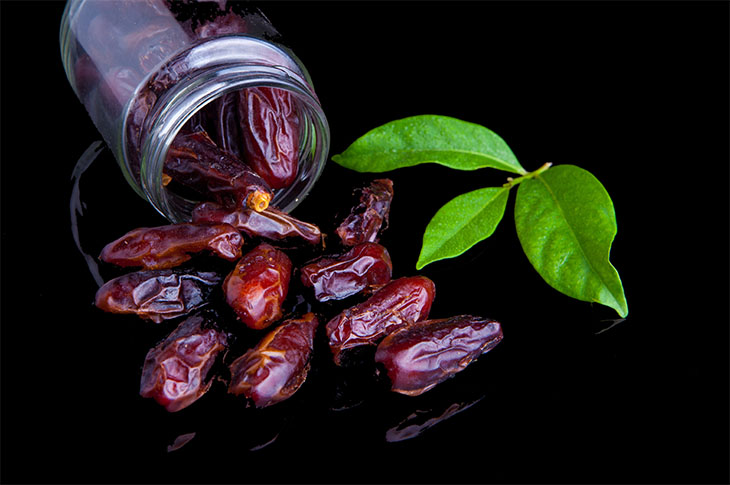
As many of us try to reduce our intake of sugars, the debate continues over which sweetener is best. While the typical contenders—coconut sugar, agave, maple syrup, stevia, monk fruit—are still in this battle, dates are gaining traction. These dried fruits are no longer only for eating as a snack or dessert; now you can buy date syrup to use in baked goods, drinks, marinades, drizzles for roasted veggies and salads, and more. The question is, are dates the best way to add a touch of sweetness to your day?
“Dates are naturally very sweet, and some health-conscious consumers prefer to get their sugar from whole foods,” says Mascha Davis, MPH, RDN, author of the newly released Eat Your Vitamins. When you enjoy the fruit whole, you’re getting antioxidants and some minerals such as calcium to support bone health, magnesium for muscle contraction, and potassium, which is essential for proper cell functioning.
Plus, there’s fiber. “The fiber causes the date sugars to be absorbed into the bloodstream a bit slower,” Davis explains, “so dates do not spike your blood sugar quite as much as the equivalent amount of regular sugar or syrup does.” This keeps you from experiencing the roller coaster peak and then plummet in blood sugar (and energy) that’s typical after eating simple sugars.
So, if you’re craving a sweet snack and want something more nutritious than a cookie, dates are a pretty good option. But don’t go overboard: Since they are fairly concentrated in sugars, Davis recommends a serving of one to two dried dates. One Medjool date typically contains about 70 calories, 4 teaspoons (or 16 grams) of total sugars, and just under 2 grams of fiber.
Date syrup is another thing. “Date syrup is not the same as a whole date and is processed just as much as other sugars,” Davis explains. Because of this, date syrup lacks fiber. Compare whole dried Medjool dates and Medjool date syrup (note that the exact nutrition facts vary from brand to brand). On average one tablespoon of date syrup contains about 60 calories, just over 3 teaspoons of total sugars (13 grams), and 0 grams of fiber.
Both dates and date syrup contain the minerals calcium, potassium, and magnesium, but only in small amounts so they aren’t considered good sources. So, all things are about equal, except for that all-important fiber.
How does a date fair in the fruit world overall? Let’s take a quick look. For roughly the same 70 calories a single date delivers you can eat…
- 1½ cups of strawberries which contains 2 teaspoons (7 grams) of total sugars and 3 grams of fiber.
- 1 small pear which contains 3½ teaspoons (14 grams) total sugars and almost 5 grams of fiber.
- 1 medium orange which contains 3 teaspoons (12 grams) of total sugars and over 3 grams of fiber.
Takeaway Fact: One date provides roughly the same amount of calories, carbs, and total sugars as one teaspoon of sugar. It also provides some fiber and slightly more minerals, but not much else. So, if you’re looking for ways to sweeten your smoothies, view them as a slightly healthier, no-added sugar substitution, but don’t go completely dippy on dates.
This information is for educational purposes only and is not intended as a substitute for medical diagnosis or treatment. You should not use this information to diagnose or treat a health problem or condition. Always check with your doctor before changing your diet, altering your sleep habits, taking supplements, or starting a new fitness routine.

If you have questions about a Fitbit tracker, product availability, or the status of your order, contact our Support Team or search the Fitbit Community for answers.
Please note: Comments are moderated and may not appear immediately after submission.